7 books about Deardorff, Alan Verne
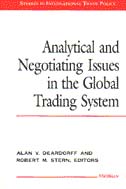
Analytical and Negotiating Issues in the Global Trading System
Alan Deardorff and Robert M. Stern, Editors
University of Michigan Press, 1994
This title was formally part of the Studies in International Trade Policy Series, now called Studies in International Economics.
[more]
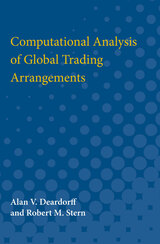
Computational Analysis of Global Trading Arrangements
Alan V. Deardorff and Robert M. Stern
University of Michigan Press, 1990
The Michigan Model of World Production and Trade, developed in the 1970s by Alan V. Deardorff and Robert M. Stern, has become a valuable tool widely used in research on the economic effects of national and multilateral trade policies. Computational Analysis of Global Trading Arrangements presents the recent developments and enhancements of the Michigan Model together with the major results that it has provided in the last seven years. The book provides a detailed exposition of the model, and chapters describe its applications to a variety of important issues of trade policy in the United States, Japan, and other major industrialized and developing countries. It includes an analysis of negotiating options in the GATT (Uruguay) Round of Multilateral Trade Negotiations. The Michigan Model discussed here provides an empirical framework within which to analyze the twenty-nine producing sectors that make up each of the world's major industrialized and developing countries. Hence, it allows the authors to demonstrate the impact upon a given country—on top of the effects of its own trade policies—of the tariffs and nontariff barriers of foreign countries. The authors of Computational Analysis of Global Trading Arrangements have compiled a volume that underscores the importance of economic interdependence in the global trading system.
[more]
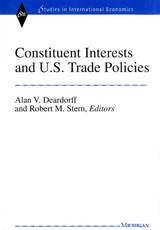
Constituent Interests and U.S. Trade Policies
Alan V. Deardorff and Robert M. Stern
University of Michigan Press, 1998
The contributors to this volume, economists and political scientists from academic institutions, the private sector, and the Ways and Means Committee of the U.S. House of Representatives, came together to discuss an important topic in the formation of U.S. international trade policy: the representation of constituent interests. In the resulting volume they address the objectives of groups who participate in the policy process and examine how each group's interests are identified and promoted. They look at what means are used for these purposes, and the extent to which the groups' objectives and behavior conform to how the political economy of trade policy is treated in the economic and political science literature. Further, they discuss how effective each group has been.
Each of the book's five parts offers a coherent view of important components of the topic. Part I provides an overview of the normative and political economy approaches to the modeling of trade policies. Part 2 discusses the context of U.S. trade policies. Part 3 deals with the role of sectoral producing interests, including the relationship of trade policy to auto, steel, textile, semiconductor, aircraft, and financial services. Part 4 examines other constituent interests, including the environment, human rights, and the media. Part 5 provides commentary on such issues as the challenges that trade policy poses for the new administration and the 105th Congress.
The volume ultimately offers important and more finely articulated questions on how trade policy is formed and implemented.
Contributors are Robert E. Baldwin, Jagdish Bhagwati, Douglas A. Brook, Richard O. Cunningham, Jay Culbert, Alan V. Deardorff, I. M. Destler, Daniel Esty, Geza Feketekuty, Harry Freeman, John D. Greenwald, Gene Grossman, Richard L. Hall, Jutta Hennig, John H. Jackson, James A. Levinsohn, Mustafa Mohatarem, Robert Pahre, Richard C. Porter, Gary R. Saxonhouse, Robert E. Scott, T. N. Srinivasan, Robert M. Stern, Joe Stroud, John Sweetland, Raymond Waldmann, Marina v.N. Whitman, and Bruce Wilson.
Alan V. Deardorff and Robert M. Stern are Professors of Economics and Public Policy, University of Michigan.
[more]
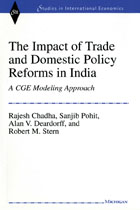
The Impact of Trade and Domestic Policy Reforms in India
A CGE Modeling Approach
Rajesh Chadha, Alan V. Deardorff, Sanjib Pohit, and Robert M. Stern
University of Michigan Press, 1998
Major economic reforms undertaken since 1991 have brought the Indian economy into a new phase of development directed toward becoming globally competitive through the opening of trade, foreign investment, and technology inflows. The private sector is expected to play a lead role, with a corresponding reduction in the role played by the public sector. This book is aimed at analyzing the comparative static effects of selected post-1991 trade and domestic policy reforms on trade, factor prices, economic welfare, and the intersectoral allocation of resources.
The study relies on a computable general equilibrium (CGE) model that has been specially designed to analyze the potential economic effects of India's policy reforms. The model was developed in a collaborative effort involving the National Council of Applied Economic Research in New Delhi and the University of Michigan. Patterned after the Michigan CGE Model of World Production and Trade that has been in use for more than two decades, the India CGE model features closer attention to special characteristics of India's economic structure, including more agricultural sector detail, allowance for state ownership, and administered pricing. The conclusions of the study suggest that the policy reforms will yield increased real returns to land, labor, and capital, and shift the terms of trade in favor of Indian agriculture. Lastly, not only are there efficiency-enhancing intersectoral shifts in resource allocation but there are notable increases in scale economies across the Indian manufacturing sectors.
Rajesh Chadha and Sanjib Pohit are Economists at the National Council of Applied Economic Research in New Delhi. Alan V. Deardorff and Robert M. Stern are Professors of Economics and Public Policy, University of Michigan.
[more]
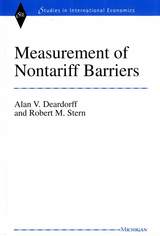
Measurement of Nontariff Barriers
Alan V. Deardorff and Robert M. Stern, Editors
University of Michigan Press, 1998
As tariffs on imports of manufactures have been reduced as a result of multi-lateral trade negotiations, interest in the extent to which existing nontariff barriers may distort and restrict international trade is growing. Accurate and reliable measures are needed in order to address the issues involving the use and impacts of nontariff barriers. This study assesses currently available methods for quantifying such barriers and makes recommendations as to those methods that can be most effectively employed. The authors focus both on the conceptual issues arising in the measurement of the different types of nontariff barriers and on the applied research that has been carried out in studies prepared by country members of the OECD Pilot Group and others seeking to quantify the barriers.
Nontariff barriers include quotas, variable levies, voluntary export restraints, government procurement regulations, domestic subsidies, and antidumping and countervailing duty measures. The authors discuss the many different methods available for measuring the effects of these and other nontariff barriers. Illustrative results are presented for industrial OECD countries, including Australia, Canada, Germany, Norway, the European Union, the United Kingdom, and the United States. Finally, the authors offer guideline principles and recommend procedures for measuring different types of nontariff barriers.
Economists, political scientists, government officials, and lawyers involved in international trade will find this an invaluable resource for understanding and measuring NTBs.
Alan V. Deardorff and Robert M. Stern are Professors of Economics and Public Policy, University of Michigan.
[more]
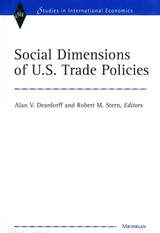
Social Dimensions of U.S. Trade Policies
Alan V. Deardorff and Robert M. Stern, Editors
University of Michigan Press, 2000
The contributors to this volume include numerous members of the trade policy community who analyze and discuss the salient social dimensions of U.S. trade policies. These issues include the effects of trade on wage inequality; trade and immigration policy; U.S. trade adjustment assistance policies; the effects of NAFTA on environmental quality; the role of labor standards in U.S. trade policies; the economics of labor standards and the GATT; issues of child labor; and the role of interest groups in the design and implementation of U.S. trade policies.
Chapter authors are Kyle Bagwell, Claude Barfield, George J. Borjas, Drusilla K. Brown, Alan V. Deardorff, Nancy Dunne, Gary S. Fields, John Kirton, Mike Jendrzejczyk, Phyllis Shearer Jones, Edward E. Leamer, Robert Naiman, Gregory K. Schoepfle, Robert W. Staiger, and Robert M. Stern.
Commenters are Steve Beckman, Jagdish Bhagwati, Alan V. Deardorff, Avinash Dixit, Pharis Harvey, David van Hoogstraten, John H. Jackson, Lawrence Mishel, Jack Otero, J. David Richardson, Dani Rodrik, Mark Silbergeld, and T. N. Srinivasan.
Alan V. Deardorff and Robert M. Stern are Professors of Economics and Public Policy, University of Michigan.
[more]
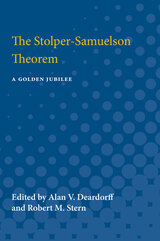
The Stolper-Samuelson Theorem
A Golden Jubilee
Edited by Alan V. Deardorff and Robert M. Stern
University of Michigan Press, 1994
In celebration of the fiftieth anniversary of the Stolper-Samuelson Theorem, this volume collects in one place the original Stolper-Samuelson articles as well as the most significant later contributions that interpret, extend, and test the basic result. It also includes reflective papers by both Wolfgang F. Stolper and Paul A. Samuelson, an overview of the literature, and an annotated bibliography.Contributors to the volume, either in reprints of their original articles or in new commentary, are Robert E. Baldwin, Sundari R. Baru, Jagdish N. Bhagwati, John S. Chipman, Alan V. Deardorff, Wilfred Ethier, Ronald W. Jones, Murray C. Kemp, Ulrich Kohli, Paul R. Krugman, Edward E. Leamer, Stephen P. Magee, Lloyd A. Metzler, Ronald Rogowski, Paul A. Samuelson, Jose A. Scheinkman, Robert M. Stern, Wolfgang F. Stolper, and Leon Wegge.
[more]
READERS
Browse our collection.
PUBLISHERS
See BiblioVault's publisher services.
STUDENT SERVICES
Files for college accessibility offices.
UChicago Accessibility Resources
home | accessibility | search | about | contact us
BiblioVault ® 2001 - 2025
The University of Chicago Press









